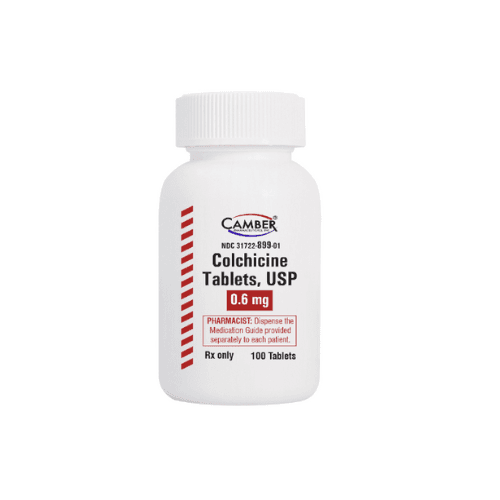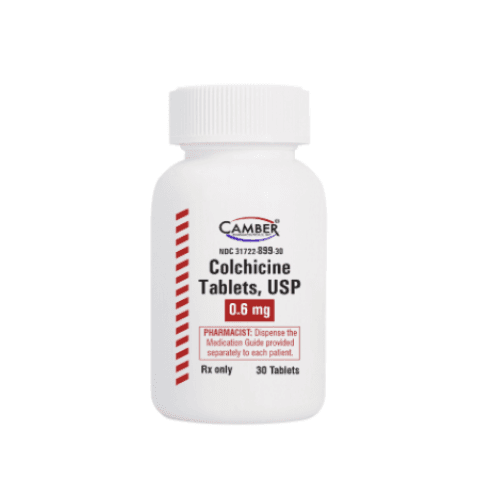Shipping with this method takes 3-5 days
Colcrys® Tablets for Gout and Familial Mediterranean Fever
Stock up and Save - Get 20% off when you buy 3 or more of any one product. Use code SAVE20 at checkout.
Coupon code cannot be combined with other offers. Sale applies to all products originating from Canada. Maximum allowable quantity equal to a 90 day supply per single order.
$43.99
Secure Encrypted Payments
Colchicine is a prescription anti-inflammatory used for gout flares and familial Mediterranean fever. We carry colchicine 0.6 mg for prescriber-directed care, with access even without insurance. This product Ships from Canada to US through our pharmacy channel.
What Colchicine Is and How It Works
YouDrugstore is a licensed Canadian pharmacy in Manitoba. Pharmacists review prescriptions before dispensing. Colchicine reduces inflammatory activity by disrupting microtubule assembly in neutrophils. This limits migration into joints and tissues, which can help ease swelling and pain during flares. The effect also helps lower the frequency of attacks in patients with familial Mediterranean fever.
We source multiple manufacturers to support continuity of therapy. A colchicine 0.6 mg tablet is the most common presentation for adults. Colcrys® is a well-known brand tablet; Mitigare® is a capsule option. The treatment should be used exactly as directed by your prescriber and the official label.
Who It’s For
Colchicine is indicated for the treatment of acute gout flares in adults and for prophylaxis of gout flares. It is also indicated for familial Mediterranean fever in adults and certain pediatric patients, per label. People with severe kidney or liver impairment should avoid combined use with strong CYP3A4 or P-gp inhibitors. Those with known blood disorders, serious gastrointestinal disease, or prior toxic reactions should discuss risks.
Pregnant or breastfeeding individuals should review potential risks and benefits with a healthcare professional. Older adults and those with renal or hepatic impairment may require closer monitoring. Always follow your prescriber’s guidance and the approved product information.
Dosage and Usage
For acute gout flares, many labels describe an initial dose at the first sign of pain, followed by a second dose one hour later. Do not repeat treatment for a flare within three days unless your prescriber instructs otherwise. For gout prophylaxis, doses are typically taken once or twice daily as directed. For familial Mediterranean fever, a daily schedule is used and may be adjusted based on response and tolerability.
Swallow tablets or capsules with water. Take the medicine consistently at the same times each day when used for prevention. A reference phrase found on some labels is colchicine tablets 0.6 mg, but your prescriber may tailor therapy. If you are also starting long-term urate-lowering therapy, your clinician may keep this medicine in place to reduce flare risk during initiation.
Do not alter dose on your own. If your clinician changes therapy due to side effects or other medicines, follow their instructions and the official label for details.
Strengths and Forms
Common presentations include:
- colchicine 0.6 mg oral tablet
- Capsules in similar strength where available
Brand and generic availability can vary by manufacturer and country. Packaging sizes may differ. Your prescription will specify the form dispensed.
Missed Dose and Timing
If you miss a prophylactic dose, take it when remembered unless it is near the time for your next dose. If it is close, skip the missed dose and resume the regular schedule. Do not double doses. For acute flare dosing, timing is important; follow the instructions provided with your prescription and the label.
Storage and Travel Basics
Store at room temperature in a dry place. Keep the medication in its original, child-resistant container with the label intact. Protect from moisture and excessive heat. Do not store in your bathroom or a hot car. When traveling, carry the medicine in your hand luggage, along with a copy of your prescription. Keep out of reach of children and pets.
If you use a pill organizer, refill it carefully and retain the original bottle for reference. For international travel, confirm local rules and carry appropriate documentation.
Benefits
This therapy can help limit pain and swelling during gout flares when taken as directed at flare onset. With regular use for prevention, it may reduce how often flares occur. For familial Mediterranean fever, the medicine helps lower attack frequency and intensity according to approved indications. Many patients value the small tablet size and simple once- or twice-daily schedules for ongoing management of their condition.
Some patients and prescribers look for a colchicine 0.6 mg generic option for flexibility and access. Talk with your clinician about the best approach for your needs.
Side Effects and Safety
Common effects:
- Diarrhea or loose stools
- Nausea or vomiting
- Abdominal cramping
- Fatigue or headache
Serious risks can include myotoxicity or rhabdomyolysis, peripheral neuropathy, and bone marrow suppression. These risks may increase with interacting medicines, renal or hepatic impairment, or higher exposure. Stop the medicine and seek care for severe muscle pain or weakness, unusual bleeding or bruising, signs of infection, or severe gastrointestinal symptoms. Overdose can be life-threatening; keep this product secure.
Drug Interactions and Cautions
Important interactions include strong CYP3A4 inhibitors (for example, clarithromycin, ketoconazole) and P-gp inhibitors (for example, cyclosporine, verapamil). These can raise colchicine levels and increase toxicity risk, especially in patients with kidney or liver impairment. Concomitant use with certain statins or fibrates may raise the risk of muscle injury. Use caution with digoxin and avoid grapefruit or grapefruit juice.
Tell your prescriber and pharmacist about all medicines and supplements you take. Do not start or stop interacting drugs without professional guidance.
What to Expect Over Time
During a flare, best results typically come from early dosing as directed on the label. For ongoing prevention, consistent daily use may help reduce the frequency of flares over time. If you also use urate-lowering therapy, your clinician may continue prevention until your uric acid targets are maintained. Keep a simple log of symptoms and any side effects to discuss at follow-up appointments. If your condition changes, contact your healthcare professional.
Compare With Alternatives
Long-term urate lowering is often achieved with xanthine oxidase inhibitors. Two options we carry are Febuxostat and Allopurinol. These medicines help reduce uric acid and lower the risk of future gout flares. For acute pain relief during a flare, nonsteroidal anti-inflammatory drugs such as naproxen are commonly used when appropriate. Your prescriber will determine which combination fits your health status.
Pricing and Access
We offer transparent Canadian pricing with US shipping from Canada. If you would like to review options, check our product page for the colchicine 0.6 mg price details and available manufacturers. Next, read the label information to confirm the form your prescriber ordered.
For budgeting, compare generic and brand availability and consider larger fills when appropriate. Our platform shows current options so you can estimate your colchicine 0.6 mg cost before checkout. See our seasonal offers on the Promotions page when available.
To learn more about related conditions, browse Gout and Familial Mediterranean Fever categories. For supportive care, see our Pain Inflammation section.
Availability and Substitutions
Supply can vary by manufacturer and pack size. If a specific brand or form is unavailable, your prescriber may recommend an equivalent option based on medical need and local regulations. We dispense according to your prescription and local substitution rules.
Patient Suitability and Cost-Saving Tips
Good candidates include adults with gout needing flare treatment or prevention, and appropriate patients with familial Mediterranean fever as indicated. Those with severe renal or hepatic impairment, significant blood disorders, or prior serious reactions may require alternative strategies. Always discuss your full medical history and medicine list with your clinician.
To reduce costs, consider multi-month prescriptions if appropriate for your care plan. Use refill reminders to maintain continuity and help prevent gaps that might trigger flares. If your prescriber transitions you to urate-lowering therapy, ask whether continuing prevention temporarily is recommended. For acute pain adjuncts, talk about options such as Naproxen or, when appropriate, a short course of Prednisone. For background reading, see Most Common Arthritis. Our checkout uses encrypted checkout for security.
Questions to Ask Your Clinician
- Is this medicine for flare treatment, prevention, or both for me?
- How should I time doses if I get a flare overnight?
- Which other medicines should I avoid while taking this therapy?
- What signs of toxicity should prompt a call or visit?
- How long should I continue prevention once flares improve?
- If I start urate-lowering therapy, how does this fit in?
- Are tablets or capsules better for me given my other conditions?
Authoritative Sources
DailyMed: Colchicine Tablets (Colcrys)
Health Canada Drug Product Database
Ready to proceed? Place your prescription with YouDrugstore for express US delivery from Canada, with temperature-controlled handling when required. This page is educational and does not replace your prescriber’s advice.
Express Shipping - from $25.00
Prices:
- Dry-Packed Products $25.00
- Cold-Packed Products $35.00
Shipping Countries:
- United States (all contiguous states**)
- Worldwide (excludes some countries***)
Standard Shipping - $15.00
Shipping with this method takes 5-10 days
Prices:
- Dry-Packed Products $15.00
- Not available for Cold-Packed products
Shipping Countries:
- United States (all contiguous states**)
- Worldwide (excludes some countries***)
What conditions does colchicine treat?
Colchicine is approved to treat acute gout flares and to prevent flares in adults. It is also indicated for familial Mediterranean fever in adults and certain pediatric patients per label. Your clinician may combine this therapy with urate-lowering medicines for long-term management of gout. Use it only as directed and report any concerning symptoms promptly to your healthcare professional.
How should I take colchicine during a gout flare?
Labels commonly describe taking an initial dose at the first sign of a flare, followed by a second dose one hour later. Do not repeat treatment for a flare within three days unless your prescriber instructs otherwise. Take with water and avoid interacting medicines. If you have kidney or liver problems, your clinician may provide specific instructions from the official label.
Can I use colchicine every day to prevent flares?
Many patients use a daily schedule for prevention when directed by a prescriber. The aim is to reduce how often flares occur. Your healthcare professional will determine the duration and dose based on your medical history, labs, and other therapies. Do not change your regimen without professional guidance, and review the official label for details.
What are common side effects of colchicine?
The most frequently reported effects include diarrhea, nausea, vomiting, and stomach pain. Some people also notice fatigue or headache. Serious risks can involve muscle injury, neuropathy, or blood disorders, especially with interacting medicines or organ impairment. Seek care if you develop severe muscle pain, unusual bleeding, signs of infection, or persistent gastrointestinal symptoms.
Which medicines interact with colchicine?
Strong CYP3A4 and P-gp inhibitors, such as clarithromycin, ketoconazole, cyclosporine, and verapamil, can raise colchicine levels and increase toxicity risk. Certain statins and fibrates may heighten the chance of muscle injury. Digoxin and grapefruit products also require caution. Always provide your full medicine list to your prescriber and pharmacist before starting or stopping treatments.
How should I store colchicine at home and during travel?
Keep it at room temperature in a dry location, away from heat and moisture. Store in the original, child-resistant container with the label. When traveling, carry the medication and prescription in hand luggage. Avoid leaving it in hot or cold environments, such as a parked car. Keep out of reach of children and pets at all times.
What if I miss a dose when I’m using colchicine for prevention?
If you miss a scheduled dose for prevention, take it when remembered unless your next dose is due soon. If it is almost time for the next dose, skip the missed one and resume your regular schedule. Do not double up to make up for a missed dose. For questions about timing around flares, follow your prescriber’s instructions and the label.

